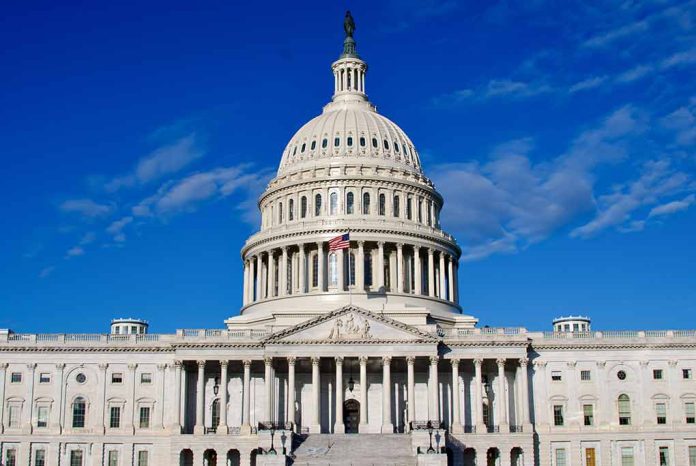
President Trump is mobilizing a formidable five-step strategy to safeguard the Republican House majority in 2026, recognizing that losing control could trigger a third impeachment attempt from vengeful Democrats eager to derail his administration’s agenda.
Key Takeaways
- President Trump is implementing a comprehensive strategy to defend the Republicans’ narrow 8-seat House majority in the 2026 midterms, including persuading incumbents to remain in office and early candidate endorsements.
- The “One Big Beautiful Bill Act” is central to the GOP’s midterm strategy, making Trump’s 2017 tax cuts permanent, ending taxes on tips and overtime pay, and boosting border security funding.
- Trump has already raised over $35 million for the National Republican Congressional Committee and plans to deploy his $500 million political apparatus to support competitive races.
- Democrats are poised to launch impeachment proceedings and investigations if they regain House control, focusing on allegations of profiting from office and accepting foreign gifts.
- Elon Musk’s decision to halt political spending represents a significant setback for Republican fundraising efforts after his previous $288 million donation to Trump’s campaign.
Trump’s Defensive Strategy to Secure House Majority
With Republicans holding a precarious 220-212 seat advantage in the House, President Trump has devised a comprehensive plan to maintain and potentially expand this majority in the 2026 midterms. Historical patterns show the president’s party typically loses seats in midterm elections, with rare exceptions in 1998 and 2002. Recognizing this challenge, Trump is actively working to prevent Republican lawmakers from retiring or seeking other offices, as evidenced by his endorsement of New York Representative Mike Lawler despite Lawler’s interest in running for governor.
“[Trump] knows the stakes firsthand. He saw what could happen. It’s clear he doesn’t want that again. Investigations, impeachment – he knows it’s all on the table, Stated Jeffries.”
Trump’s approach includes early endorsements for candidates in crucial swing districts to prevent primary challenges and Republican infighting. The strategy aims to unify party support and present a strong front against Democratic opponents. Additionally, the president is leveraging his influence as a “closer” to recruit strong candidates for competitive races, particularly in districts without GOP incumbents. This proactive candidate selection process is crucial for maintaining Republican control of the House.
The “One Big Beautiful Bill” as a Political Cornerstone
Central to the Republican midterm strategy is the “One Big Beautiful Bill Act,” which narrowly passed the House after last-minute negotiations with conservative members over Medicaid work requirements. The comprehensive legislation aims to make Trump’s 2017 tax cuts permanent, eliminate taxes on tips and overtime pay, end car loan interest taxation, boost border security and defense spending, implement Medicaid reforms, and reclaim unused green-energy tax credits. These measures have garnered strong support in key districts, with polling showing high approval among registered voters.
“We want to ensure that people can feel the effects of it well in advance of the midterm elections” Stated Mike Johnson
Speaker Mike Johnson has emphasized the clear contrast between Republican and Democratic priorities, positioning the GOP as focused on delivering tangible benefits to American families while portraying Democrats as obstructionist. House Republicans are urging the Senate to pass the bill quickly, recognizing its potential impact on their electoral prospects. The legislation represents not just a policy achievement but a strategic political tool designed to demonstrate Republican governance effectiveness ahead of the crucial midterm elections.
Financial Firepower and Fundraising Challenges
President Trump is marshaling substantial financial resources to support Republican candidates in competitive races. His political apparatus, valued at approximately $500 million, will channel funds through Political Action Committees like Securing American Greatness and Never Surrender. Trump has already demonstrated his fundraising prowess by raising over $35 million for the National Republican Congressional Committee at a recent dinner, with plans for continued appearances at fundraising events throughout the election cycle.
“A promise of Trump’s help and an endorsement can be key in getting a wanted recruit to make the leap” Stated Gorman
However, the Republican fundraising strategy faces a significant setback with Elon Musk’s decision to halt political spending. Musk previously contributed $288 million to Trump’s campaign, making his withdrawal from political donations a potential blow to GOP finances. This development introduces uncertainty into Republican fundraising efforts and may necessitate adjustments to their financial strategy as they prepare for the midterm battles. The party will need to compensate for this loss by expanding their donor base and maximizing the effectiveness of their existing resources.
Democratic Threats and Impeachment Concerns
If Democrats regain control of the House, they are expected to pursue aggressive investigations and potentially a third impeachment effort against President Trump. Democrats have raised concerns about insider trading, Trump’s acceptance of a $400 million jet from Qatar, and Elon Musk’s potential profits from defense contracts. These allegations would likely form the basis for investigations should Democrats secure a House majority, threatening to derail Trump’s legislative agenda and create political turbulence during his term.
“House Democrats have already provided just a small preview of what a Democratic majority would bring: distractions, division, and nonstop Trump Derangement Syndrome.”
Republican messaging consistently emphasizes this threat, framing the midterm elections as crucial for maintaining governmental stability and policy momentum. By highlighting the potential consequences of Democratic control, Republicans aim to motivate their base and appeal to independent voters who may be wary of political turmoil. This strategy positions the GOP as the party of governance and accomplishment, contrasting with characterizations of Democrats as focused primarily on opposition to Trump rather than substantive policy initiatives.




